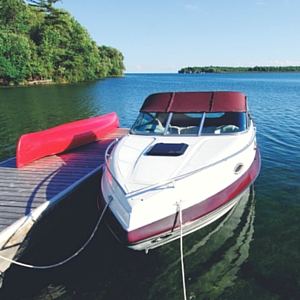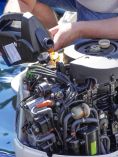Keep Yourself Anchored When Buying a Boat

Buying a boat is a lot like buying a car. It's a big expense, so you have to do your homework. First you have to decide what kind of boat you want. Then you have to determine what you're willing to spend, which will help you determine if you want to buy new or used.
How You Want to Hit the Waves
You might already know what kind of boat you want. If not, start by determining if you want to use it for cruising, fishing or watersports.
Once you know what type of boat you want, you'll need to determine the size in feet. The size you choose will largely be determined by how many passengers you think you'll have with you at any given time. Keep in mind that the bigger your boat is, the more flexibility you'll have with it in the future; but you won't be able to take it on a trailer if it's longer than 26 feet.
Next, decide on the size of the motor. The size of motor you need depends on what you are using your boat for as well as the size of the boat itself. If you're just using it for fishing, you won't need as much horsepower as you will if you're pulling skiers or have a larger boat.
New or Used?
That is really a matter of personal preference. Similar to buying a new or used car, there are pros and cons. Unlike a new car, a new boat won't lose as much value as quickly after you buy it, but as with any large purchase, you want to make sure you don't overpay for your vessel. After all, you don't want to find out you are under water if you need to sell it.
Whatever you decide, you should price new boats first. That way, if you decide to buy used, you'll know what a fair price is for the model you want. You can also check NADA, Kelly Blue Book and ABOS Marine Blue Book. And don't rush your decision—take your time, do research and shop around.
What to Look for in a Used Boat
When you think you've found a used boat you're interested in, check to see how well it was cared for. Little or no maintenance could translate to engine issues or other problems. Don't forget to check for these signs of trouble:
- Cracked or blistered fiberglass or signs of repair
- Scrapes or damage to the bottom of the boat
- Cracks in the hull
- Musty odors inside the boat
- An uneven floor
All of these are signs that the boat has either been in an accident or that it needs repairs of some sort. Also, if the boat is in saltwater, ask if the saltwater was washed off after each use.
If the exterior and interior look good, inspect the trailer:
- Do all the lights work correctly?
- Are the tires in good condition?
- Is it rusting anywhere?
Finally, check the motor, battery and gas tank:
- Is the propeller in good condition with no nicks?
- Is the bilge clean with no signs of oil leakage?
- Are the belts and wires in good condition?
- Are the hoses all connected tightly?
- Is the oil clean or does it look like a chocolate milkshake? (According to boatreeds.com, this could be a sign that water is in the oil.)
At this point, if you are satisfied with the boat, ask to take it for a test ride. Simply listening to the motor when it's not in the water won't give you an idea of how it will run when you take it out in the water.
Whether you buy new or used, and make sure you get the proper boat insurance coverage. It's also a good idea to take a boat safety course, and keep your boat stocked with the appropriate safety equipment. When you've done all that, you're ready to enjoy a great summer on the water!
-
Boat Safety Training
 Learn More
Learn MoreNothing ruins a fun day on the lake quite like a boating accident. Taking a training course can help prepare you.
-
Water Skiing Tips
 See Tips
See TipsWater skiing can make a day on the water even more enjoyable, but there are a few things you should know first.
-
Boat Care 101
 See How
See HowBuying a boat so you can finally hit the waves is exciting. Now that you have one, here’s how to take care of it.
